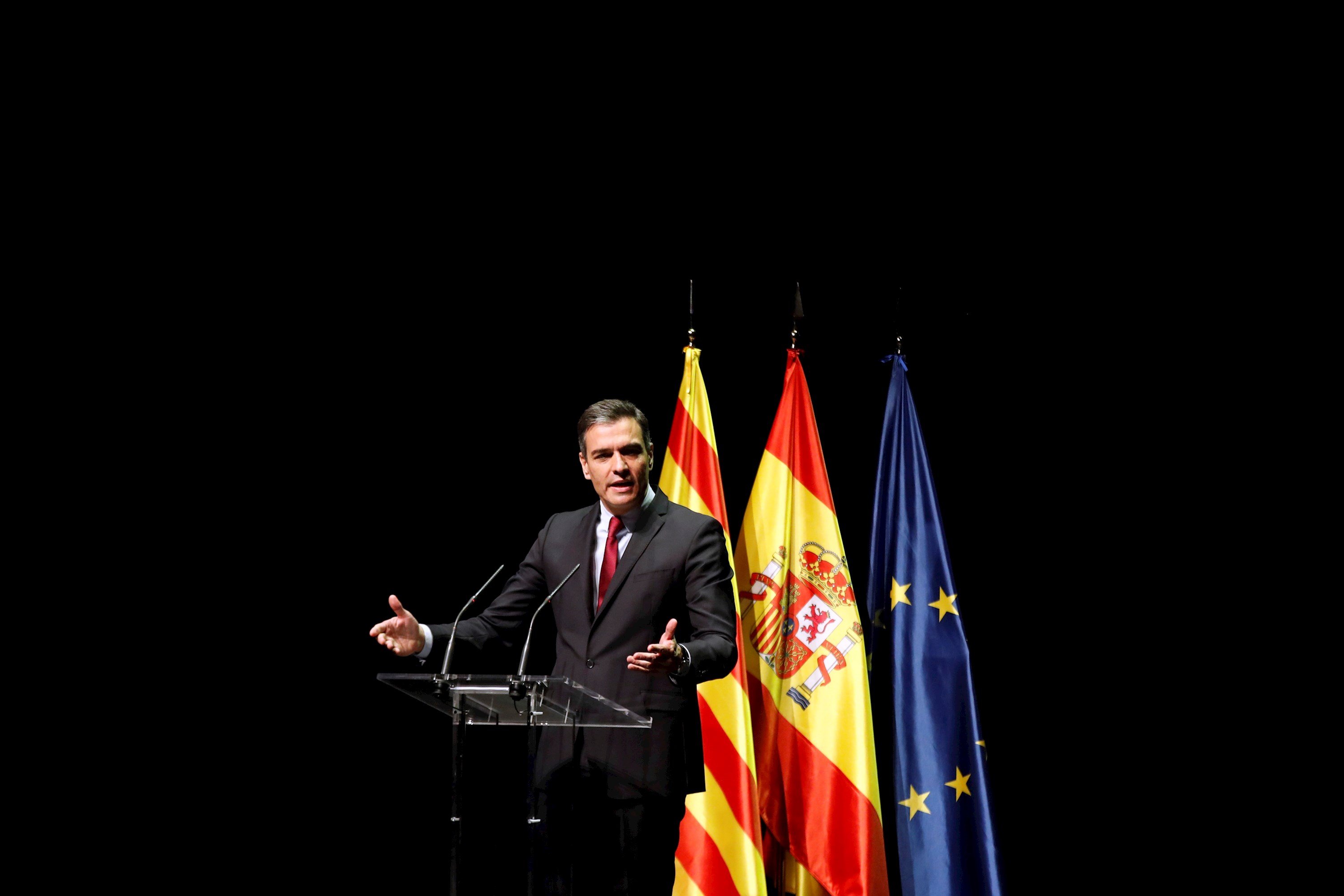He began by quoting Catalan literary figures Miquel Martí i Pol and Juan Marsé, and defining the Gran Teatre del Liceu, the chosen venue for today's presentation, as a symbol of reconstruction, for having risen from the ashes after the major fire of 1994. Spanish prime minister Pedro Sánchez came to Barcelona to confirm that this Tuesday's cabinet meeting in Madrid will finally approve the pardons for the Catalan pro-independence prisoners. And he justified the plan in a thirty minute speech. "Someone has to take the first step. Tomorrow we can change the lives of nine people, and hopefully we will start to change history," he affirmed, arguing that "there is no need to wait for a more auspicious moment." Outside he was awaited by a noisy protest calling for an amnesty law and self-determination.
Pedro Sánchez: "It could seem that this measure only affected the nine prisoners, but it is addressed to the whole of Catalan society and the whole of Spanish society."
The announcement was not entirely a monologue, thanks to a heckler - a member of the left-wing, pro-independence group Arran - who had managed to obtain admission to the event and rebuked the Socialist leader, holding up an estelada flag, just at the moment when he was announcing that the pardons would be approved tomorrow. During his speech he admitted that he is aware of the "rejection" generated by the clemency measure in parts of both Catalan and Spanish societies. "I respect them, I understand them," said the Spanish PM. And he tried to justify his reasons for going ahead with the move. "Understanding the reasons for rejecting the measure, the Spanish government has decided to commit to reconciliation. This measure of grace will allow us to start again and do things better." In a message clearly addressed to the Popular Party, he recalled that the pardon is a fully constitutional and absolutely legal element that "does not question or revoke the court sentence."
"Don't agree to the pardons, they are what the state needs": Pro-independence protester inside the Liceu theatre gives a message to his fellow Catalans.
European pressure
Following the Spanish PM's usual line, the most repeated words were unity, concord and coexistence. The address was entitled Re-encounter: A project for the future, for all of Spain, but there was only one subject addressed. The entire talk served to present with all possible pomp the pardons measure that the PSOE-Podemos government is to embark on, as pressure on the matter from European institutions grows. Sánchez himself acknowledged that "the cost of maintaining this situation is prohibitive, Spain cannot afford it." And he expressed confidence that the gesture will end up being widely accepted by most Spaniards and Catalans. "We release nine prisoners, but we add millions of people to social harmony." From his point of view, "releasing the nine prisoners who represent thousands of Catalans is a resounding message of the desire to live together in coexistence."
In this sense, he presented the pardons as "a first step" in reactivating the dialogue with Catalonia. "We do not expect those who defend independence to abandon their ideals, we only demand that we all adhere to the Constitution," stressed the head of the Spanish executive. And he took the opportunity to warn that there is no space "outside the law."

Pedro Sánchez escorted out of the Liceu. / S. Alcazar
Down in the stalls
In the stalls of the grand opera house, around 300 guests from Catalan civil society and the political arena had been invited, but the seating area was far from full. No members of the Catalan government attended an event that they consider "propagandist." Among the most prominent faces who were present: Spanish government delegate, Teresa Cunillera, the mayor of Barcelona, Ada Colau, the president of empoyers association Foment, Josep Sánchez Llibre, the president of infrastructure firm Saba, Salvador Alemany, the president of Banc Sabadell, Josep Oliu, business group leader Javier Faus (Cercle d'Economia) and Antonio Cañete (PIMEC), the heads of the Barcelona Trade Fair, Pau Relat, of the water company Agbar, Ángel Simón, of Spanish airport operator Aena, Maurici Lucena, rail operator Renfe, Isaías Táboas, the leader of the anti-independence group Societat Civil Catalana, Fernando Sánchez Costa, the editor of La Vanguardia, Javier Godó, and the top echelon of the Catalan Socialist Party, led by Salvador Illa. Also present were former Barcelona mayors Joan Clos and Jordi Hereu (both Socialists), as well as former Catalan minister Santi Vila, who was one of those tried by the Supreme Court in the leaders' case, but not convicted to jail. There were also representatives of the world of culture present, such as the actor Josep Maria Pou. One of the surprise guests was Ernest Benach, who, according to ElNacional.cat, represented his company, which had received an invitation - he did not go as a former speaker of Parliament, which is the other hat that he wears.
Return to the Pedralbes Declaration box
Last week, Catalan president Pere Aragonès suggested a point of departure which, from his point of view, would be a credible beginning. He invited Sánchez to return to the Pedralbes Declaration, which then-president Quim Torra signed with the Spanish PM in December 2018, in which the Spanish state recognized the existence of a "political conflict", and committed to an "effective dialogue" to "shape a political proposal that has broad support in Catalan society." All within a "framework of legal certainty" and it was decided that the "democratic response" that would emerge from this should be articulated on the basis of "appropriate legal modifications".
Sanchez made no mention of that document today.
In the main image, Pedro Sánchez at the Liceu. / EFE

